Recent results from IDC’s 1Q 2021 Consumer Tech Brand Sentiment survey reveal the most trusted tech brands and the attributes which make them successful. Read on to find out more about how you can build trust in your brand.
Trust in Tech Brands
Each quarter, IDC’s Brand Trust Index measures consumer trust in a different set of 20 tech brands, helping tech companies to see the importance of cultivating trust in their brands.
Brand trust matters because it drives deeper relationships with consumers leading to increased usage, product and service penetration, loyalty, and – ultimately – profitability. Consumers give the benefit of the doubt to the brands they trust and give them “license” to extend into new areas, launching new products, services, and apps.
This quarter consumers evaluated these brands:

The Leader: Bose
Perhaps surprisingly, Bose came out on top as the most-trusted brand. Known for its premium sound quality, Bose topped other longstanding brands as well as more recent entrants like Roku and Zoom.
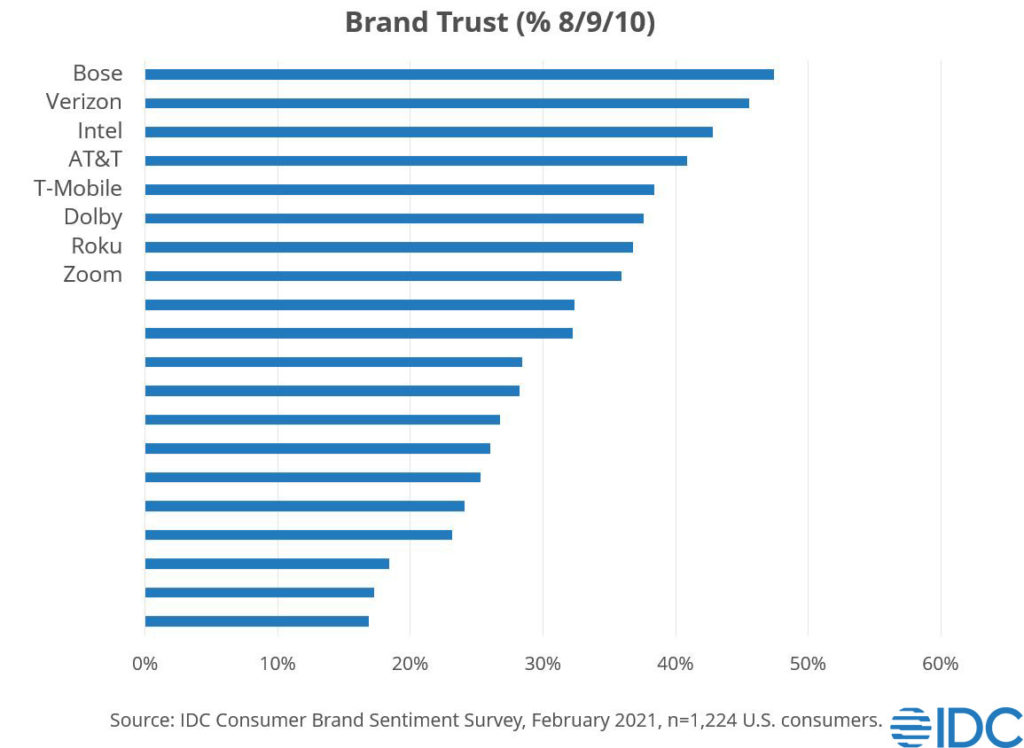
Daily Judgments
As they go through their daily lives, consumers make three judgments about brands. “Do they get me? Do they really understand what I want? How does that show up in the products and services they deliver?” This sense of being understood is the initial empathy which draws consumers into relationship with a brand, leading them to try one of its products or services.
Now the test is about the brand’s ability to deliver the desired experience with quality, innovation, and consistency. This core competency is crucial to winning and keeping consumers’ trust.
Finally, consumers watch closely how companies act. Are they transparent in the way they do business? Do they consistently do the right thing? Do they protect consumer privacy? Are they socially responsible?
Empathy, competence, and integrity provide key diagnostics behind each brand’s level of trust.
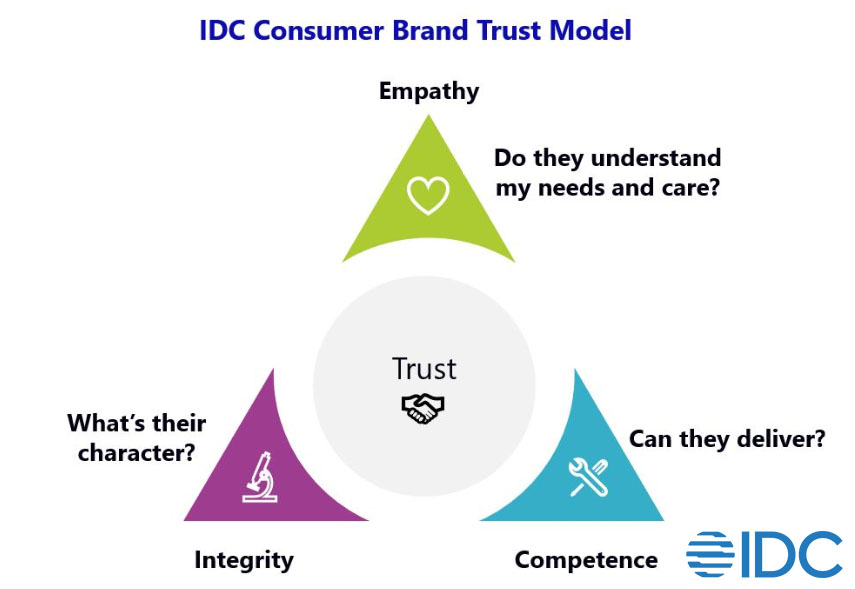
Trust Diagnostics
Bose’s lead over Verizon is due to its much higher level of core competence. Consumers clearly believe the brand delivers, fulfilling its core value proposition better than Verizon. The two are perceived to share a similar level of Empathy, with Verizon leading on Integrity among the top brands.
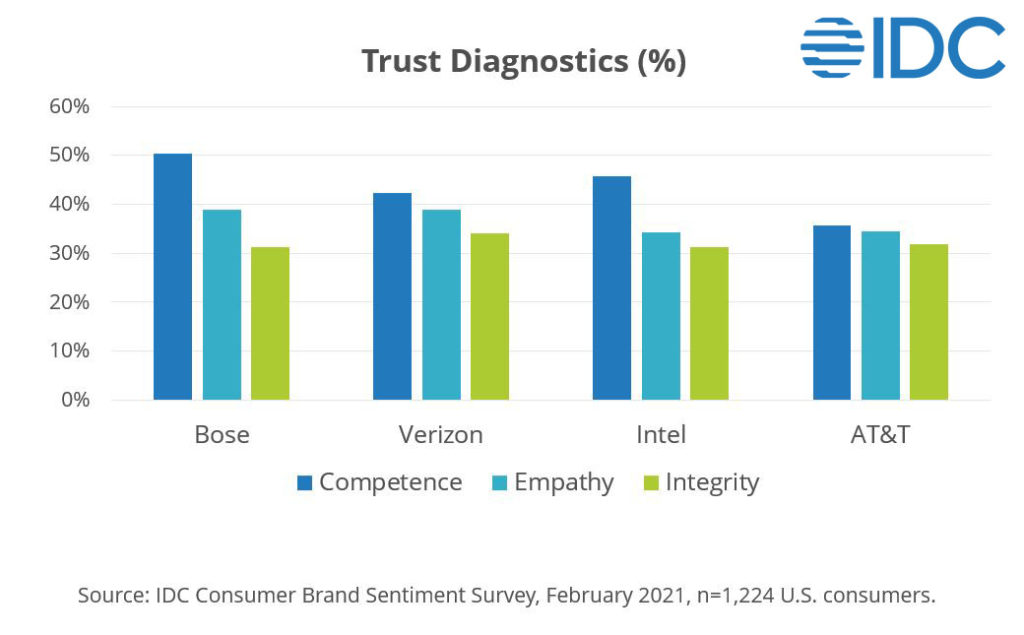
Like Bose, Intel shares a similar strong ability to deliver (competence) but is not seen as doing as good a job of understanding consumers’ needs (empathetic). AT&T performs unusually similarly across the three themes, seen by consumers as lagging in its ability to deliver on the related supporting attributes – a well-known brand but which lacks standout characteristics.
Similar Levels of Trust, Different Personalities
T-Mobile, Dolby, Roku, and Zoom tied for the fifth spot, with statistically equivalent levels of trust. Interestingly, they seemingly took very different paths to get to a similar result.
T-Mobile stands out for its empathy; consumers clearly see it as approachable. This goes hand-in-hand with its reputation as a value carrier. However, consumers’ assessment of its ability to deliver on what they want in a wireless carrier is a key point holding it back. Recent investments in its new 5G network may help to overcome this core perception, but it will take a sustained effort alongside its continued empathetic approach.
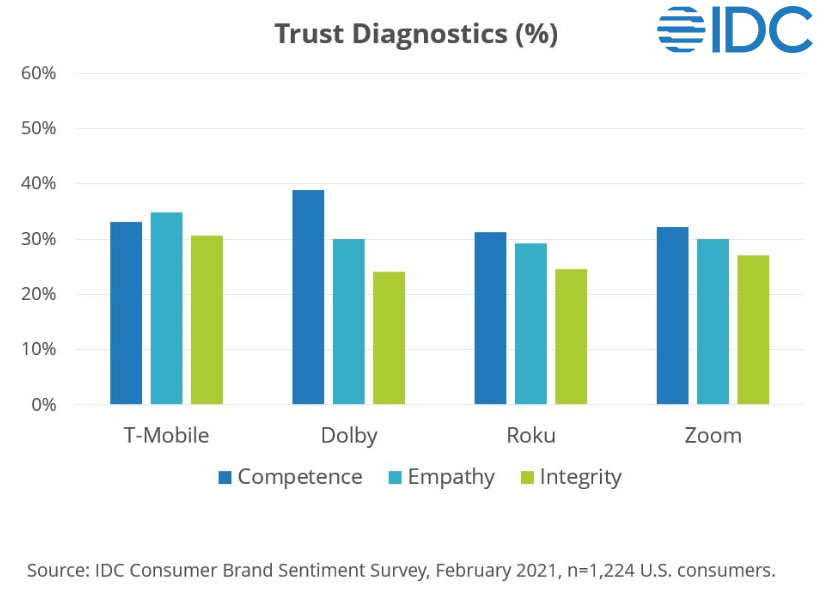
Dolby trails Bose across the board. Like Bose, Dolby stands out for its high-quality sound yet trails T-Mobile by a wide margin for Empathy and Integrity. Roku and Zoom still have more to do to prove that they can deliver. This explains why they trail Dolby and T-Mobile.
Compared against the wider set of brands IDC measured most recently, Bose would rank ninth out of forty.
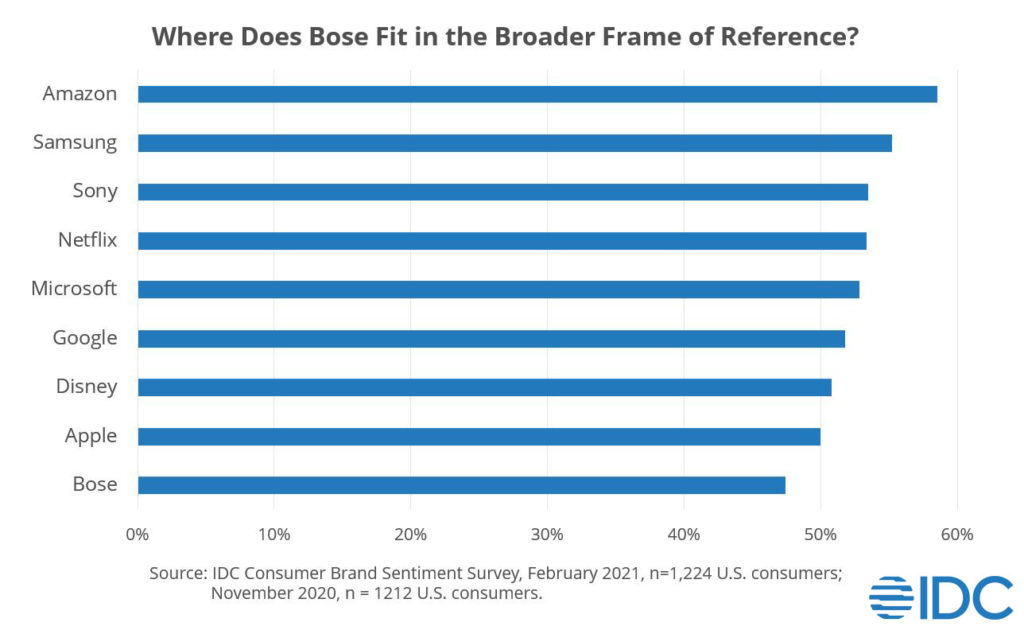
Bose is more than ten points behind Amazon, which remains atop IDC’s list of most-trusted tech brands. Amazon benefits from the frequent contact consumers have with the brand and the virtuous cycle of orders and deliveries. With the pandemic, the intensified use of Amazon’s ecommerce platform and Prime Video reinforce its number one position, together with its other cloud services. Amazon stands out from both Bose and Apple for its approachability and for making things right when something goes wrong. Similarly, Amazon holds a wide advantage on two other key consumer perceptions: personal relevance and value for the money.
Bose & Zoom are Top Brands with Halos
Of the top eight brands measured this quarter, only Bose and Zoom had meaningful halos, with consumers rating their opinion of the brand higher than expected given their level of trust. Bose has clearly established strong brand equity which has consumers willing to see them expand and do more. Zoom, on the other hand, has shown some inconsistency in its initiatives but has won consumer trust and has comparatively high marks for Empathy and Integrity. Zoom shows continued future potential.
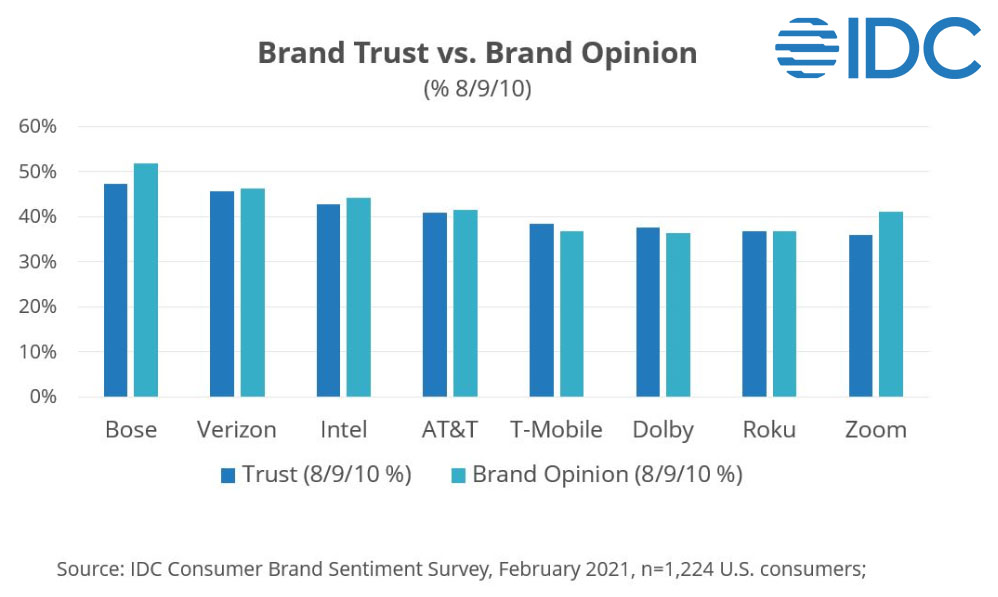
Key Takeaways & Actionability for Product Developers, Marketers & Strategists
- Brand trust is important to market success – not just product specifications.
- Trust can and should be cultivated.
- Carefully and systematically work to understand consumers’ journey and needs, and design products and services to explicitly meet and exceed them.
- A long-term commitment to consumers’ needs and consistency in doing so are required to build trust.
- Progress can be seen in the short-term, with each step forward noticed and appreciated by consumers, with intangible benefits accrued over the long-term.
Let IDC’s new Consumer Tech Purchase Index (CTPI) be your compass for navigating these uncertain times; view our on-demand webinar here:
IDC’s Consumer Technology Strategy Service (CTSS) leverages a system of frequent consumer surveys to provide B2C marketers with the full view of the consumer they need to anticipate and meet changing consumer needs and to outperform their competitors. This includes measuring brand trust and helping companies to understand how to cultivate it.
In addition to my syndicated service, I work closely with clients on custom research projects and consulting. Find out more here.




